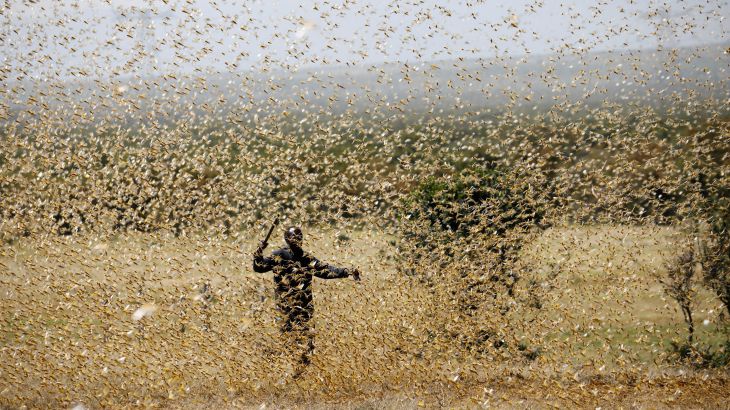
Can East Africa’s locust plague be stopped?
The Stream discusses several different ways global warming is affecting the planet.
On Wednesday, March 4, 2020 at 19:30 GMT:
From feasting locusts to melting glaciers to betting on a doomsday seed vault, The Stream takes a look at global warming’s effects around the world. Join the conversation.
Locust plague
Authorities in East Africa are racing to counter swarms of voracious locusts who have been eating their way through seven countries, including Kenya, Ethiopia and Somalia. If left unchecked, the insects could multiply 400-fold by June, decimating crops in a region that’s already home to 19 million hungry people, according to the United Nations.
Locusts are not uncommon to the Horn of Africa region, but the recent surge in swarms has been attributed to warmer temperatures.
With us to discuss:
Fatouma Seid @SeidFatouma
Representative in Ethiopia, Food and Agriculture Organization of The United Nations
fao.org/ethiopia
Melting glaciers
Antarctica experienced its hottest day on record in February, during a heat wave that has been driving dramatic ice melt in the region. On February 6, Antarctica reached 18C, the same temperature as Los Angeles.
Scientists are warning that the consequences of rapidly melting glaciers could be disastrous. Sea levels will rise, endangering coastal towns, and oceans will absorb more heat, putting marine life in peril.
With us to discuss:
Clare Nullis @ClareKapp
Spokeswoman, World Meteorological Organization
public.wmo.int
Seed vault
Amid talks of plagues and locusts, some good news: a “doomsday” food vault in the Arctic has recently accepted its millionth seed variety. The Norway-based Svalbard Global Seed Vault opened in 2008 and aims to safeguard food security in the event of failed future harvests.
The world’s largest seed bank is nestled in an Arctic archipelago, which should help keep its contents frozen in the event of a power failure. But climate change is already causing permafrost in the area to melt, forcing the facility to complete a €20 million renovation to protect against rising temperatures.
With us to discuss:
Lise Lykke Steffensen @LiseLykkeS
Executive Director, The Nordic Genetic Resource Center
nordgen.org
Read more:
Running out of time: East Africa faces new locust threat – Reuters
Why Are Swarms Of Locusts Wreaking Havoc In East Africa? – NPR
Images show massive Antarctic change in just 9 days – CNN
Global seed bank gets largest deposit since it first opened – New Atlas
What do you think?Leave your thoughts in the comments below.